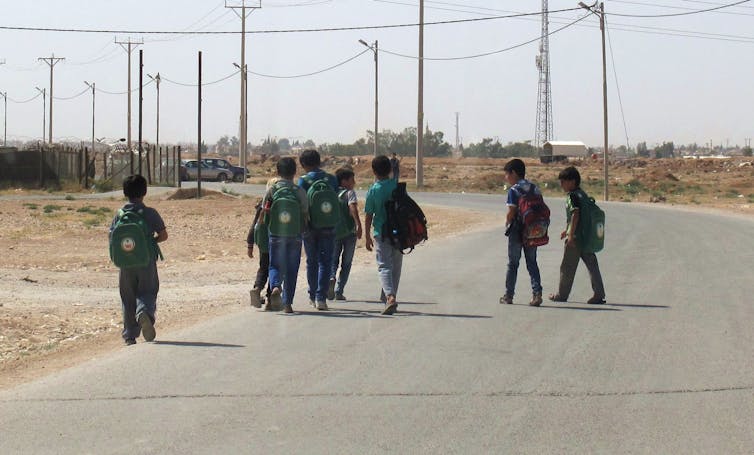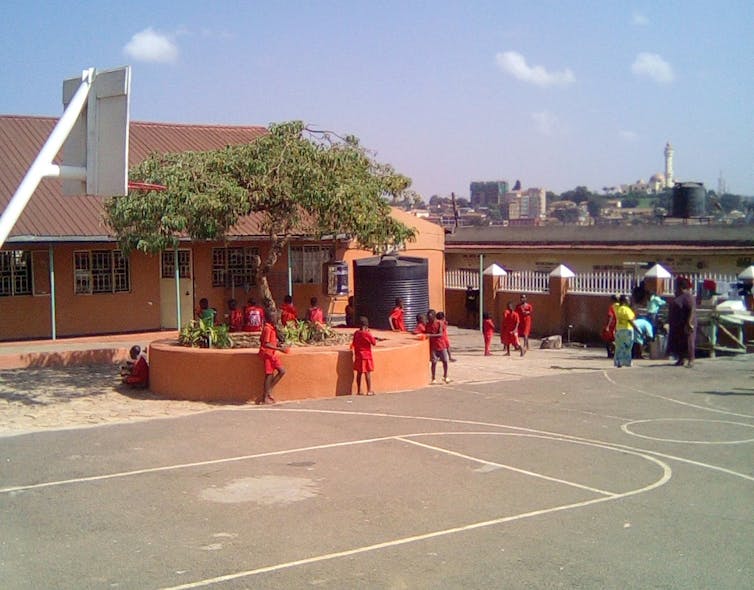In 2012, at 10 years of age, Daahir sat in his school classroom in Mogadishu, Somalia. The sounds of gun shots piercing the air interrupted the lesson. As Daahir ran back home, he overheard that fighting had erupted between government forces and the militant group Al-Shabab. Daahir arrived home to find his father dead from gunshot wounds. Faced with further threats and imminent violence, Daahir and his family, along with many others, fled their home country in search of safety and stability abroad.
According to the UN refugee agency (UNHCR), 51% of the world’s refugee population is under the age of 18. That means some 600m young people are living in unstable or conflict affected areas across the globe. There is an urgent need to understand how young people are affected by forced migration over the course of their lives. That’s why, in 2017, the Department for International Development commissioned Professor Lorraine van Blerk, Dr Wayne Shand and myself at the University of Dundee, to conduct a research project on how being a refugee affects young people’s transitions to adulthood.
Adulthood is not a fixed stage which is attained at a specific age. Rather, it’s achieved by crossing boundaries such as leaving your parents’ home, completing education, getting a job and, in many cultures, entering into marriage. These transitions are complex processes, which typically involve close relationships with family or caregivers.
But young people who have been displaced from their homes or live in poverty are often denied the economic, educational or social opportunities which would enable them to pass these milestones. Often, their environment forces them to be dependent on their family, or other forms of support, for longer. The processes which young people go through on their way to adulthood can be accelerated, delayed or reversed, as they try to reconcile their personal plans for the future, with hardships they are encountering every day as refugees.
As part of our research, we trained and supported refugees between the ages of 15 and 24 as youth researchers to conduct interviews and surveys among their peers in Uganda and Jordan. The youth researchers and their participants in Uganda came from Somalia and the Democratic Republic of Congo, while those in Jordan were Syrians, Iraqis and Palestinians from Gaza. Daahir – the young Somali participant – was based in Kampala, Uganda. We took this approach on the basis that all young people are experts on their own lives, and capable of expressing their needs when they are given the opportunity to do so.

We encouraged our youth researchers to take photographs and make drawings and videos with other young refugees to depict what it’s like growing up as a displaced person. We put together the material they produced to create an online story map – a multimedia platform which illustrates the project’s findings and tells the personal stories of young refugees.
For the young refugees who took part in our project, education, work and family life were the main sources of disruption during their transition to adulthood. Education is often a requirement for getting a decent job, and the loss of education certificates through conflict and displacement has made it difficult for young refugees to continue their studies. Many feel like “failures” for not completing their schooling and being unable to find decent work.
The young refugees’ lack of qualifications and social connections in both Uganda and Jordan have made it difficult to find work and sustain a livelihood. Getting married and starting a family is viewed as another means to establish social and adult status, but the cost of a dowry and wedding expenses prevent young refugees from completing this rite of passage.
Financial issues are not the only hindrance: the instability of their circumstances discourages young people from entering into marriage, as it can complicate and worsen conditions for both parties involved. It might also conflict with aspirations for the future, such as relocating and settling down elsewhere.
Finding a path
Daahir didn’t just lose his father to the war in Somalia – he also lost years of education, as he migrated through different countries. Daahir is still completing primary school in Uganda at 15 years of age. In Somali culture, 15 is the age when a young person is considered an adult. But the interruption and delay of Daahir’s education, due to displacement and lack of money, has had a ripple effect on his transition into adulthood, both personally and within the Somali refugee community.

The delay and rupture Daahir has experienced as he is growing up will have a significant impact on his future. Daahir’s diminishing interest and motivation in school may affect his ability to lead a successful adult life. With many years of school left ahead of him – and his family living in a precarious financial situation – Daahir will need to grapple with difficult decisions such as whether to continue his education, look for work and/or start a family, as he transitions from childhood to adulthood and develops different needs and aspirations.
Displacement and forced migration rupture young people’s plans for their adult lives. So specific support is needed to ensure that the changes to their pathways into adulthood are addressed in a positive way. The nature of conflicts and crises make it difficult to prevent these ruptures, but agencies and governments can tailor support to be more responsive to the realities of being a young refugee.
![]() Names have been changed to protect the anonymity of the participants.
Names have been changed to protect the anonymity of the participants.
Laura Prazeres, Post-Doctoral Researcher, University of Dundee
This article was originally published on The Conversation. Read the original article.




 Publications
Publications
 Partners
Partners





















